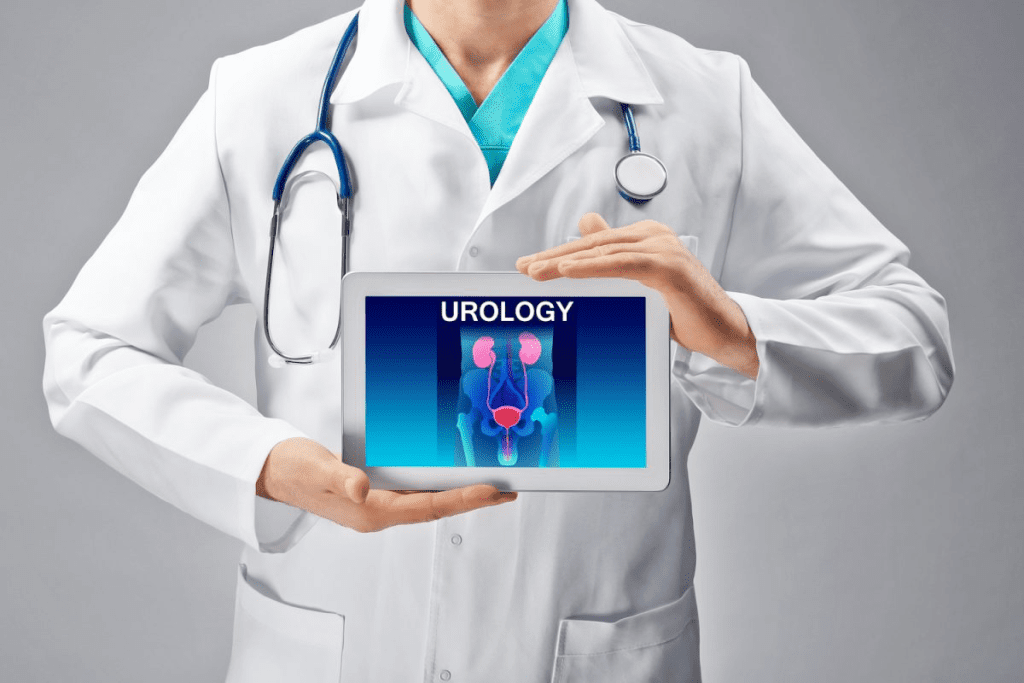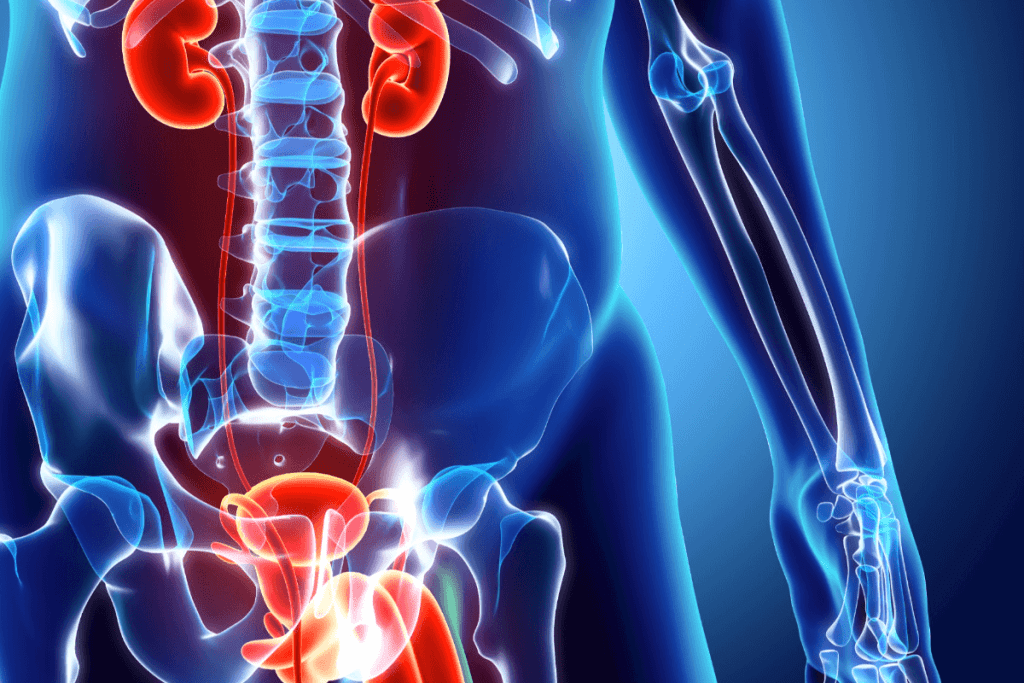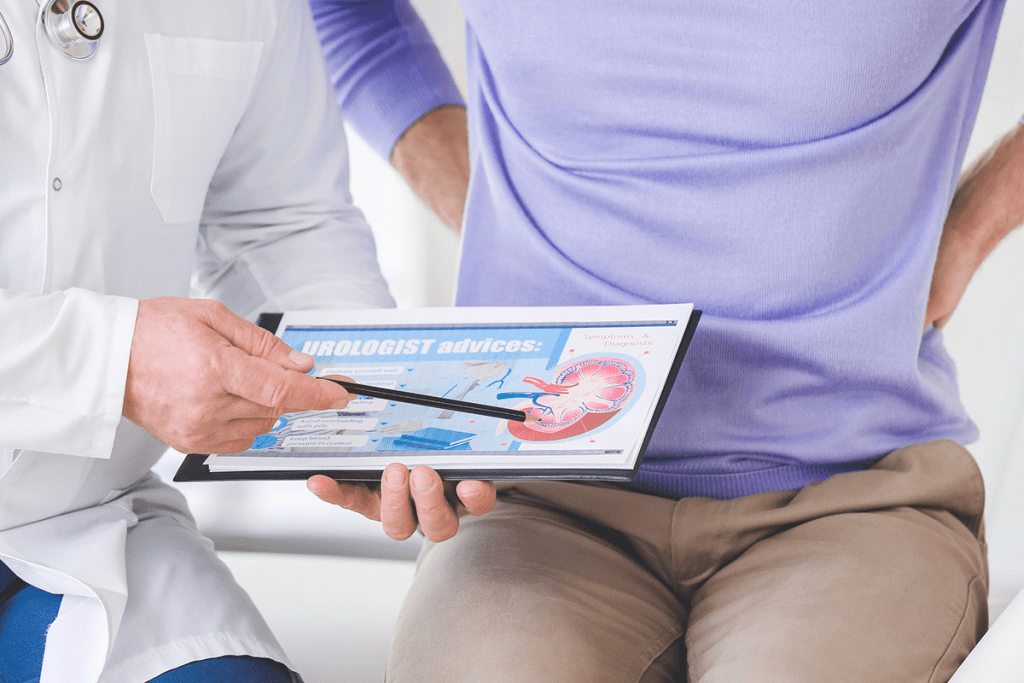Last Updated on October 31, 2025 by

Erectile dysfunction (ED) is a common issue affecting millions of men worldwide. It is closely linked to the male genitourinary system. Urologists are key in diagnosing and treating ED. Urology focuses on the urinary and reproductive systems, making it the main field for ED management.
ED often stems from underlying health issues. Urologists must take a detailed approach to treatment. This understanding helps healthcare providers offer better care.
Erectile dysfunction, or impotence, is when a man can’t get or keep an erection for sex. It’s not just about sex; it can show other health problems like diabetes or heart disease. It also points to mental health issues.

Erectile dysfunction (ED) is a mix of physical and mental factors. It happens when blood flow, nerve signals, or hormones don’t work right. The medical literature shows that ED often comes from blood vessel problems.
The main reasons for ED include:
The male reproductive and urinary systems work together. Problems in one can affect the other. A urologist, who knows about both systems, is often the first doctor men see for ED.
It’s important to understand how these systems are connected. Urologists are key in treating ED because of their deep knowledge of both systems.
Urologists handle most cases of erectile dysfunction (ED) because of their specialized training. They are medical experts who deal with urinary and reproductive system disorders. Their deep knowledge makes them the best choice for treating ED.

Many ED cases are seen by urologists. About 58% of ED visits go to urology specialists. This shows how important urologists are in treating ED.
Urologists have the training to give complete care for ED. They help from the first diagnosis to ongoing treatment.
Urologists get special training for ED. They learn about the urinary and reproductive systems. This knowledge helps them find and treat the root causes of ED.
They also know that ED can be a sign of other health issues like heart disease or diabetes. Urologists work with other doctors to give full care. This approach helps men’s sexual health and overall well-being.
It’s key to know how common erectile dysfunction is to help men everywhere. ED is a big health problem that affects men and impacts public health and healthcare systems.
Looking at the numbers, ED is a big issue. At least 150 million men globally suffer from ED, and this number is expected to grow.
ED affects a lot of men. It’s found in many parts of the world, with different rates in different places and ages. Knowing how common it is shows we need to spread awareness and find treatments.
Health experts say we need to do more to help men with ED. They say we must work on better ways to diagnose and treat it. This shows ED is a big public health issue.
Experts think more men will have ED by 2025, reaching 322 million. This increase is due to more older men and more health problems like diabetes and heart disease.
We need to plan for this increase in ED cases. We must make sure there are enough doctors and treatments available.
Looking ahead, we must focus on urological care for ED. By understanding the problem and finding solutions, we can help millions of men live better lives.
Erectile dysfunction (ED) is common but often untreated. It affects many men worldwide. Yet, many cases are not diagnosed or treated.
The gap between ED cases and official diagnoses is large. Studies show many men have ED symptoms but few get diagnosed. This gap shows we need more awareness and diagnosis efforts.
ED can signal other health problems. Getting diagnosed early is key. But, many men don’t get help because of shame or not knowing about treatments.
Several barriers keep men from getting diagnosed:
We need to tackle these barriers. We must create a supportive space for men to get help without fear.
Not treating ED early can lead to serious health issues. ED is often linked to diseases like diabetes and heart disease.
Ignoring ED symptoms can cause bigger health problems. For example, ED can be a sign of heart disease, which needs quick attention.
There’s a strong link between ED and heart disease. Research shows men with ED are more likely to get heart disease. This highlights the need for early diagnosis and treatment of ED.
Men with ED symptoms should get checked by a doctor. Early treatment can help with both ED and heart health.
Urologists use many tools and methods to check for erectile dysfunction (ED). This detailed way helps find the real reasons for ED, not just treat the symptoms.
First, we look at a patient’s medical history and do a physical check-up. We check their overall health and any medicines they take. Some medicines can cause ED. A physical exam also finds any body problems that might lead to ED.
We also use special questionnaires, like the International Index of Erectile Function (IIEF). These help us know how bad ED is and how it affects a person’s life. This info helps us make a treatment plan that fits the patient’s needs.
At times, we use new tech to check for ED. For example, penile ultrasonography checks blood flow to the penis. This is key for getting and keeping an erection. Studies on PubMed Central show these tests help us understand ED better.
Other tests, like nocturnal penile tumescence (NPT) testing, measure erections during sleep. This helps us tell if ED is caused by mind or body issues.
We aim to find and fix the real causes of ED, not just treat its symptoms. This way, we can make a treatment plan that works well over time. This might include changing lifestyle habits, taking medicine, or other treatments based on the patient’s needs.
By tackling the root causes of ED, we can not only fix erections but also improve a person’s health and happiness. This is what makes urological care for ED so special.
Urologists offer many advanced treatments for erectile dysfunction. These treatments aim to solve the complex issues of ED. They provide effective solutions that meet each patient’s needs.
Phosphodiesterase type 5 (PDE5) inhibitors are often the first choice for ED. These ED medications boost blood flow to the penis. This helps men get and keep an erection. We start with these because they work well and have few side effects.
But, not everyone responds to PDE5 inhibitors. The cause of ED, overall health, and other medications can affect how well they work.
For those who don’t respond to pills or need a more focused treatment, intracavernosal injections are an option. This involves injecting medication directly into the penis. It can lead to a more effective erection than pills.
Intracavernosal injections are great for men with severe ED or who haven’t tried other treatments. Many find it effective and easy to use.
For very severe ED or when other treatments fail, surgery might be considered. We offer penile prosthesis implantation. This involves placing a device in the penis to help get erections.
Surgery is for men with severe ED who haven’t gotten better with other treatments. We carefully decide if surgery is right for each patient.
Advanced ED treatments show why seeing a specialist is key. We offer everything from pills to surgery. This way, we can tailor care to each patient’s needs.
Erectile dysfunction (ED) is a big health issue that needs care from a urologist. Urologists handle 58% of ED visits, showing their key role. Understanding ED’s causes and effects is the first step to getting help.
Getting urological care for ED is key. It offers advanced treatments and care tailored to each person. Urologists use various treatments, like medicines and surgery, to help men with ED. This care can greatly improve a man’s life.
We urge men with ED to see a urologist. They offer ongoing support and help during treatment. With the right care, men can beat ED and feel better about themselves.
Erectile dysfunction (ED) makes it hard to get or keep an erection for sex. The male body’s systems for making babies and for going to the bathroom are connected. Problems in one can affect the other.
Urologists are key in treating ED. They know a lot about the body’s systems for making babies and for going to the bathroom. They have the skills to create good treatment plans.
Around 150 million men worldwide have ED. This number is expected to rise to 322 million by 2025. ED gets more common with age and is linked to health issues like diabetes and heart disease.
Many men don’t get help for ED because they’re shy or don’t know where to go. This means many cases go unreported. Waiting too long to get help can make health problems worse, like heart disease.
Urologists use a detailed check-up to find out why a man has ED. They might also use special tests like ultrasound to look at the penis.
Urologists have many treatments for ED, like medicines and injections. For the worst cases, surgery is an option. These treatments can really help men with ED live better lives.
ED often means there’s a health problem, like heart disease. Not treating ED can make heart disease worse.
Yes, medicines can help with ED. But, the best plan is made with a urologist’s help.
Lifestyle changes can help with ED symptoms. But, a full treatment plan from a urologist is usually needed to really fix the problem.
Subscribe to our e-newsletter to stay informed about the latest innovations in the world of health and exclusive offers!